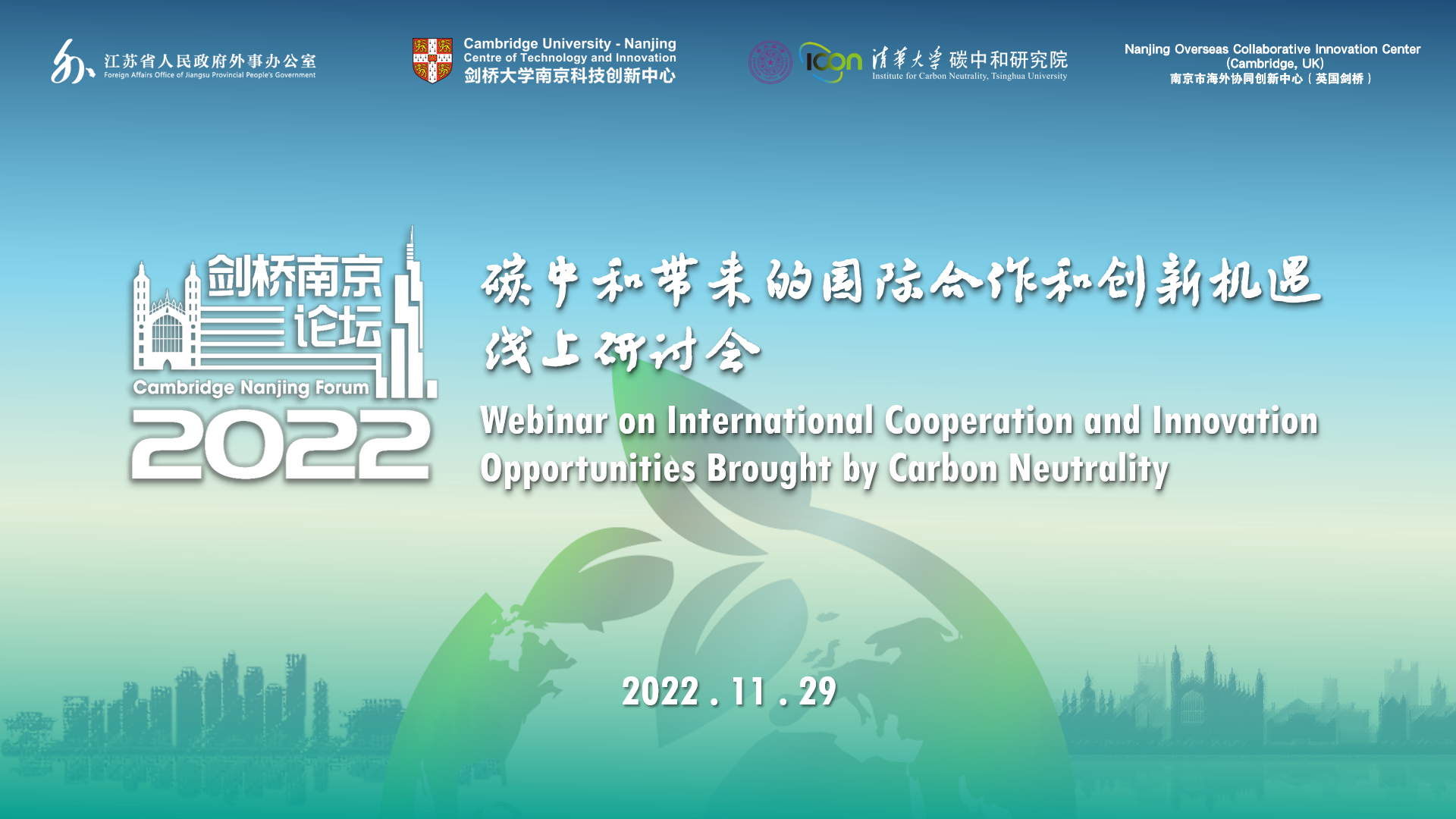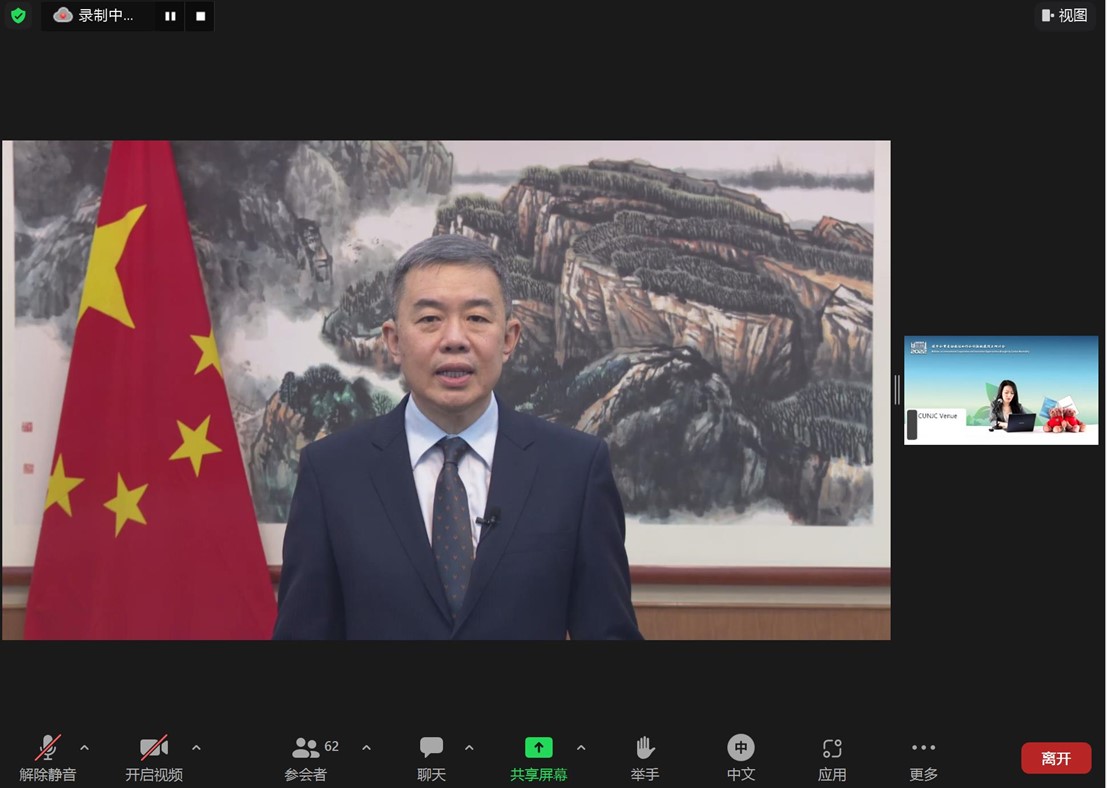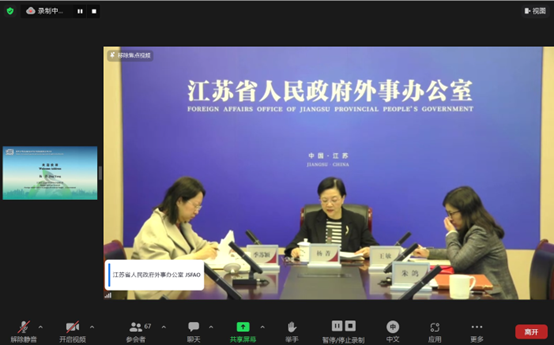Cambridge Nanjing Forum 2022 - Webinar on International Cooperation and Innovation Opportunities Brought by Carbon Neutrality
This year marks the 50th anniversary of the establishment of ambassadorial diplomatic relations between China and the UK. On 29th November, co-sponsored by CUNJC, Institute for Carbon Neutral of Tsinghua University, and Foreign Affairs Office of the Jiangsu Provincial People's Government, and co-organized by the Nanjing Overseas Collaborative Innovation Center (Cambridge, UK), Cambridge Nanjing Forum 2022 - Webinar on International Cooperation and Innovation Opportunities Brought by Carbon Neutrality was held successfully. Daping Chu, Tenured Professor of the University of Cambridge, Academic Director and CEO of CUNJC, attended the webinar. Government leaders and university experts and scholars from China and the UK discussed transnational scientific research collaboration around the practical significance, technical paths and practical examples of the "dual carbon" strategy. Over 2,000 people watched the webinar online.

The webinar has attracted great attention from both China and the UK. Xu Jie, Deputy Director-General of the International Cooperation Department of the Ministry of Science and Technology of China; Yang Jing, Deputy Director-General of the Foreign Affairs Office of the Jiangsu Provincial People's Government; He Kebin, Academician of the Chinese Academy of Engineering and Dean of Institute for Carbon Neutrality of Tsinghua University; Zhang Xian, Division Chief of Social Services and Researcher of the Administrative Center for China’s Agenda 21; Lu Xi, Assistant to the Dean of the Institute for Carbon Neutrality and Professor of the School of Environment, Tsinghua University; Grace Carey, Science and Technology Counsellor and Head of Science and Technology Policy, British Embassy in China; Sophie Durrans, Deputy Director of UKRI China; Emily Shuckburgh, Director of Cambridge Zero and Professor of Environmental Data Science, University of Cambridge, delivered online speeches or reports.
Taking international cooperation as a consensus to help achieve the goal of carbon neutrality
The just-concluded 27th Conference of the Parties (COP27) of the United Nations Framework Convention on Climate Change once again put the urgency and collaboration of decarbonization actions under the spotlight. The global climate change caused by the increase in carbon emissions is related to the common well-being of mankind. To participate in global climate governance, extensive international cooperation is urgently needed to achieve the goal of "net zero" as soon as possible, which is increasingly recognized by countries all over the world.

Deputy Director-General Xu Jie delivers a speech at the webinar
"Climate change is a major challenge faced by all mankind, and carbon neutrality is a topic of great concern and consensus between China and the UK." Xu Jie wished the success of the webinar on behalf of the Department of International Cooperation of the Ministry of Science and Technology. He emphasized: “China is actively strengthening the development of an international scientific research environment. The UK is an important scientific and technological cooperation partner of China. This year marks the 50th anniversary of the establishment of ambassadorial diplomatic relations between China and the UK, and China encourages and welcomes more successful scientific and technological exchanges and innovation cooperation between China and the UK."
In his view, China and the UK are highly compatible in terms of carbon neutrality goals and strategies. Promoting Sino-British scientific and technological cooperation through seminars, joint research projects and platform construction can contribute to the accelerated realization of the carbon neutrality goals of the two countries.

Counsellor Grace Carey delivers a speech at the webinar
The UK-China scientific and technological cooperation has a long-term solid foundation and fruitful results, among which climate change is one of the key areas of scientific and technological cooperation between the two sides. Grace Carey, the Science and Technology Counsellor at the British Embassy in Beijing, introduced that China and the UK have a common "net zero" goal, and there are similarities in decarbonization policies. China is actively building a “1+N” carbon peaking and carbon neutrality policy system, and the UK has decades of experience in implementing decarbonization policies. The two sides will explore opportunities for cooperation in decarbonization, including through joint research projects.

Deputy Director-General Yang Jing delivers a speech at the webinar
Deputy Director-General Yang introduced in detail the cooperation between Jiangsu and the UK in the fields of economy, trade, science and technology, education, and green development since the establishment of ambassadorial diplomatic relations between China and the UK, and shared the province's current efforts in carbon neutrality.
Meanwhile, she highly recognized the development of CUNJC, "In the field of scientific and technological innovation, the Cambridge Nanjing Centre is one of the landmarks of scientific and technological cooperation between Jiangsu and the UK. Relying on the solid innovation foundation and transformation ability of the University of Cambridge, the Centre has carried out extensive innovation cooperation in multiple fields in combination with local needs.”
Academician He Kebin said that under the trend of "dual carbon", the world economy and industry are facing major changes and opportunities for innovation. The economic development model is shifting from resource-dependent to technology-dependent. However, according to the report of the International Energy Agency, about half of the technologies supporting carbon neutrality in the world are still in the laboratory or demonstration stage. In this context, basic research and exchanges and cooperation between universities are particularly important. On the issue of climate change, Chinese and British universities have always maintained friendly cooperation, and the cooperation between Tsinghua University and Cambridge University has a long history. It is hoped that this webinar will be used as an opportunity to continue to enhance mutual understanding between Chinese and British scholars in the field of "dual carbon", to reach more international cooperation intentions and follow-up results in scientific and technological innovation in the field of carbon neutrality, and to help realize the vision of carbon neutrality as soon as possible.

Academician He Kebin delivers a speech at the webinar
Professor Daping Chu thanked all the guests present at the meeting. He said that under the guidance of the above-mentioned concept of international cooperation, the Centre, as an important result of the international cooperation between China and the UK, initiated this webinar from the perspective of the guiding policies and trends of "dual carbon" in China and the UK and the practice of Cambridge to solve global problems through international cooperation, to deepen joint research, and to promote the concept and practice of double carbon.

Professor Daping Chu delivers a speech at the webinar
"I hope to use the webinar as a starting point to create opportunities for multilateral exchanges, connect domestic resources such as industry, academia, research, government and capital, open up to attract more British universities to join, and promote the two sides to jointly find a feasible 'dual carbon' path for cross-border collaboration," Professor Chu shared.
Exploring the practical path of China-UK carbon neutral cooperation with support of science and technology
According to the World Meteorological Organization’s interim report on the State of the Global Climate in 2022, it is estimated that the global average temperature in 2022 will be about 1.15°C higher than the average temperature before industrialization (1850-1900), and the 2015-2022 period may have 8 hottest years on record. This summer, the United Kingdom set a new national record, with the temperature breaking 40°C for the first time; China encountered the most extensive and longest-lasting heat wave on record.
The fate of the whole world is one. At present, both China and the UK are paying great attention to the green and low-carbon field: China officially promised in 2020 that its carbon dioxide emissions will peak before 2030, and that it will strive to achieve carbon neutrality before 2060, aiming to achieve carbon peaking to carbon neutrality with the shortest time in global history and the highest reduction in carbon emission intensity; the British government passed the newly revised "Climate Change Act" in 2019, formally confirming that the country will achieve "net zero emissions" of greenhouse gases by 2050. It is one of the first countries among the world's major economies to establish the "net zero" goal in legal form.
How to promote the above-mentioned carbon neutral/net zero vision with "international scientific and technological cooperation"? Chinese and British guests shared their insights and practices.
Focusing on the "establishment and prospect of carbon neutrality technology system", Researcher Zhang analysed that the "dual carbon goals" put forward three new requirements: from the pursuit of "relative emission reduction "rate" to the pursuit of absolute emission reduction"; from controlling "energy consumption" to controlling "carbon emissions"; from focusing on "individual" emission reduction to "systemic" emission reduction which requires the overall planning of multiple dimensions such as energy supply and consumption, and industrial process emissions.
"Facing the new requirements of dual carbon, it is urgent to accelerate the construction of a zero-carbon energy system, reshape the zero-carbon process, establish a negative carbon technology system, and strengthen the supporting role of science and technology," he said, "Coping with climate change is a common challenge for all mankind. Promoting the development of carbon-neutral technology requires in-depth international scientific and technological cooperation. For example, China and the UK could conduct technical cooperation and joint research in areas such as high-resolution carbon emission monitoring technology, carbon capture utilization and storage technology, hydrogen energy utilization and energy storage technology, and zero carbon-resilient urban transformation, land-ocean carbon sink, and air pollution and greenhouse gas coordinated governance.”
The Deputy Director, Sophie Durrans, introduced the development of the UK National Research and Innovation Agency (UKRI) in China with the title "UK-China Research and Innovation Matters for Net Zero", and shared examples of scientific research cooperation in the field of carbon neutrality between the two countries. She said that UKRI is the main public funding institution for R&D and innovation in the UK, and it sets "building a greener future" as one of its strategic goals. Among them, the UKRI China Office has been in China for 15 years, and has been actively strengthening cooperation with official institutions including the National Natural Science Foundation of China. A total of more than 800 scientific and technological cooperation projects in various fields have been supported. Examples of carbon-neutral cooperation that have been carried out include smart grids, carbon accounting and assessment tools for emerging economies, and low-carbon concrete technology.
"UKRI regards China as an important research and innovation partner. China's R&D expenditure accounts for 20% of the world’s total expenditures, and it is the world's largest renewable energy investor." Deputy Director Durrans emphasized, "Research and innovation play a huge role in solving the problem of net zero emissions. UKRI China Office will conduct more interdisciplinary cooperation with China in future around the focus of net zero.”
Promoting innovation in carbon neutral research by breaking down disciplinary barriers
Research shows that, in terms of technology maturity, technologies in the basic research and demonstration stages of the current carbon-neutral technology system account for a relatively larger proportion. As the main force of basic research and the source of major scientific and technological breakthroughs, how can universities play their role as the backbone of scientific research? In this webinar, two top universities in China and the UK—Cambridge University and Tsinghua University respectively gave excellent demonstrations in this regard.
As the world's leading climate scientist, Professor Emily Shuckburgh introduced the initiatives and efforts of the University of Cambridge on zero carbon. Among them, since its establishment in November 2019, the Cambridge Zero led by Shuckburgh has made use of the wide range of resources in Cambridge from research, innovation, education, policy discussion and leadership, to maximize the contribution of Cambridge University to realise a resilient and sustainable zero-carbon world, to help solve a series of problems faced in life, society and economy, and to practice the social mission of Cambridge University.
The interdisciplinary nature of zero-carbon research is remarkable. Professor Shuckburgh introduced that the University of Cambridge has broken through disciplinary barriers, and carried out multi-field zero-carbon research projects through mechanisms such as the interdisciplinary initiative committees, and conducted multi-disciplinary research with business, industry, research institutions and local communities, striving to create a zero-carbon future that adapts to climate change.
Professor Shuckburgh further elaborated that the areas of zero-carbon research at the University of Cambridge cover energy transition, public health and society, production and resources, resilient future, transportation, cities and infrastructure, carbon emission reduction and climate restoration, digitalization and artificial intelligence. “Zero-carbon research involves and integrates almost all disciplines and professional knowledge of the university, connects a wide range of natural scientists, engineers and social scientists, and fully embodies the characteristics of systematic research.”
As a Chinese model of carbon-neutral research innovation, Professor Lu Xi shared in detail the development ideas and experience of Tsinghua University's Institute for Carbon Neutrality in terms of goals, scientific research, domestic and foreign cooperation, and talent training.
The Institute for Carbon Neutrality of Tsinghua University was established in September 2021. As an interdisciplinary research platform, the institute’s goal is to integrate the academic advantages and characteristics of Tsinghua University’s related fields, achieve original breakthroughs in major basic theories, and collaboratively create disruptive core technologies on low-carbon, zero-carbon, and carbon negative, promote the development of carbon neutrality related disciplines and the cultivation of high-level talents, and strive to become a global landmark research institution with Tsinghua characteristics and international influence in the field of carbon neutrality.
Professor Lu introduced that the Institute for Carbon Neutrality currently has eight research centres, with research directions covering low-carbon energy and carbon capture, utilization and storage (CCUS), new power systems, zero-carbon buildings, zero-carbon transportation, and industrial In-depth carbon reduction, pollution reduction and carbon reduction synergy, climate change and carbon neutral strategy, climate governance, and carbon finance. He concluded by emphasizing that “the Institute actively participates in international cooperation on climate change and carbon neutrality, and looks forward to working with domestic and international partners to promote the faster realization of the carbon neutrality goal.”
Carbon peaking and carbon neutrality are extensive and profound economic and social systemic changes, and technological innovation is the key to simultaneously achieving economic and social development and carbon neutrality. Since its establishment, the Centre has listed “zero carbon and sustainable development” as a key direction of scientific research by benchmarking against the world's cutting-edge science and technology, combining Cambridge's innovative advantages with needs of local industries. In recent years, the Centre has continued to promote and incubate a number of Cambridge alumni-related projects through ongoing research projects and roadshows, including high-power chip power supplies, green self-healing building materials, and low-concentration coalbed methane intelligent power generation system, etc.
Focusing on the orientation of original applied research and starting from this transnational webinar, CUNJC will continue to gather top innovation resources to explore and practice a complete research and innovation value chain of “original basic research - original applied innovation - technology development – industrialization”, implement the supporting role of science and technology in carbon peaking and carbon neutrality, lay a solid foundation for subsequent international exchanges and cooperation, and contribute to the early realization of the dual carbon vision.
Institutions participating in this webinar also include:
Development and Reform Commission of Jiangsu Province, Department of Science and Technology of Jiangsu Province, Department of Ecology and Environment of Jiangsu Province, Nanjing Development and Reform Commission, Nanjing Science and Technology Bureau, Nanjing Ecology and Environment Bureau, Foreign Affairs Office of Nanjing Municipal People's Government, Science and Technology Innovation Bureau of Jiangbei New Area, Economic Development Bureau of Jiangbei New Area; Beijing University, University of Science and Technology of China, Fudan University, Nanjing University, Zhejiang University, Huazhong University of Science and Technology, Shandong University, Southeast University, State Key Laboratory of Materials Chemistry of Nanjing University of Technology, Xi'an Jiaotong-Liverpool University, Yangzhou Vocational University; National Energy Group, Nanjing Iron and Steel Group, Tianneng Holding Group, JSTI Group; British Consulate General in Shanghai, etc.

 中文
中文 English
English
